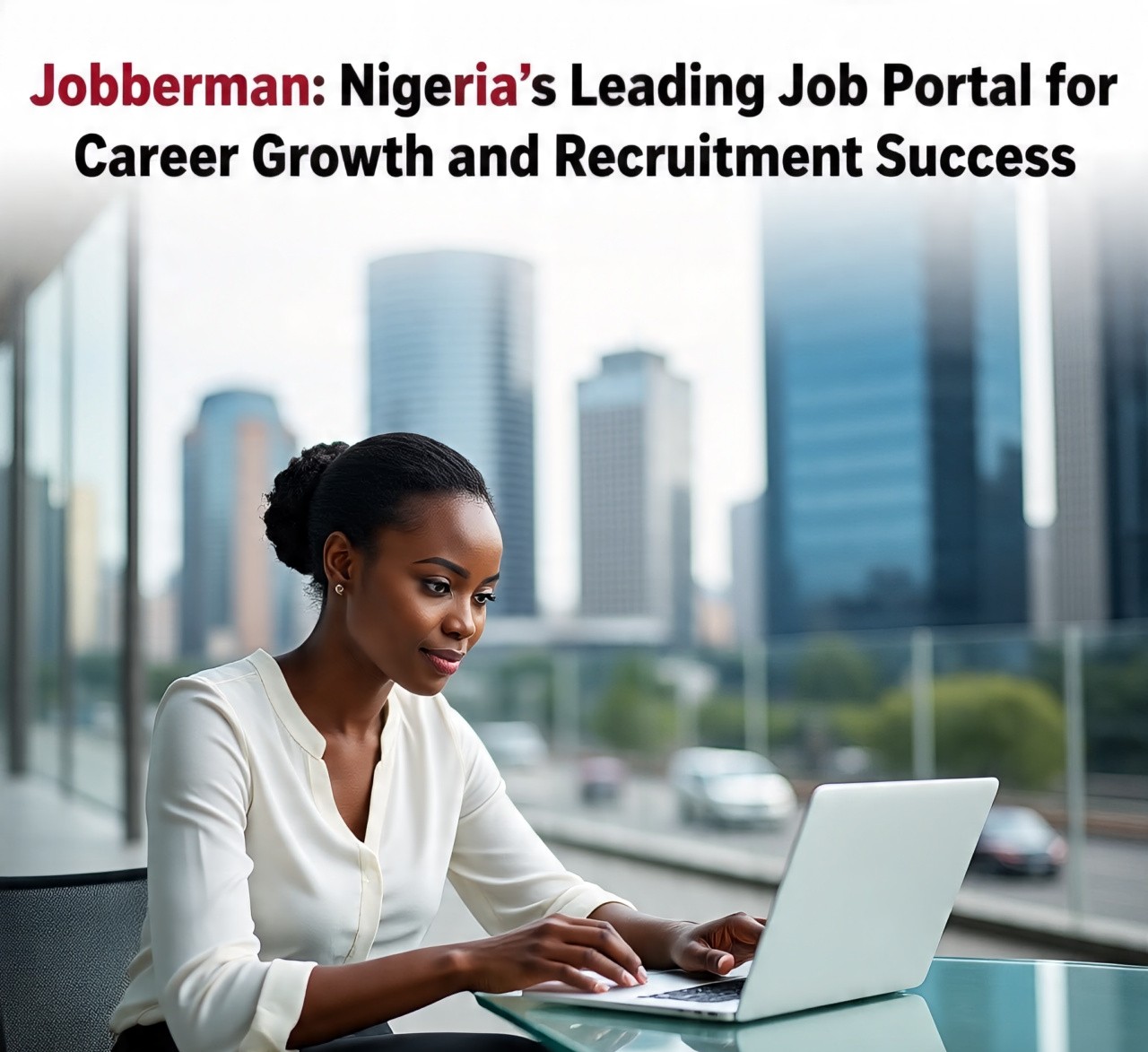Jobberman: Nigeria’s Leading Job Portal for Career Growth and Recruitment Success

Overview — Why Jobberman matters
Over the last decade and a half the company has transitioned from a pure job board into a multi-dimensional talent platform that blends listings, candidate services, employer tools and impact-driven training programs. This combination makes it a bellwether for how digital recruitment is evolving across the region.
Source: Jobberman official profile and company pages.
Founding, early days, and rapid traction
Jobberman was founded in August 2009 by three Nigerian entrepreneurs who started the business while at university: Opeyemi Awoyemi, Ayodeji Adewunmi and Olalekan Olude. What began as a simple idea — make finding jobs online straightforward for graduates and employers — quickly found product-market fit. The founders focused on solving obvious pain points: fragmented job information, slow paper-based hiring processes, and poor employer visibility. That early focus on practical utility and trust-building (via verified employer listings and clear application flows) allowed the platform to rapidly attract both job seekers and companies.
Founding details: historical company pages and profiles. 1
Within a few years Jobberman’s growth drew international investor attention. Its strong local traction and high engagement on universities and graduate networks helped propel the business to new markets and partnerships. These early wins also set a pattern Jobberman continues to follow: combine a simple product experience with offline engagement and training to turn traffic into placements.
Corporate evolution, acquisitions and structure
As Jobberman scaled it experienced two important phases of corporate change: acquisition into a regional digital media group and strategic consolidation of talent platforms. In 2015, One Africa Media (OAM) acquired a 100% stake in Jobberman, a move that gave the company access to more capital, broader distribution and integration into a pan-African media and marketplaces organisation. In the years that followed, OAM merged with Ringier Africa to form Ringier One Africa Media (ROAM), further strengthening Jobberman’s infrastructure and reach.
Acquisition and corporate history references. 2
Jobberman has also grown through product acquisitions and consolidation in its market: for example, the platform acquired NGcareers in 2020 to consolidate audience and deepen its inventory of employer relationships. These moves are part of a common digital platform playbook: expand service range, consolidate similar marketplaces, and create enterprise packages that make it easier for larger employers to standardise on the platform.
NGcareers acquisition reported by business press. 3
What Jobberman offers — product & services snapshot
Core job marketplace
The most visible Jobberman product is the job board itself: a searchable catalogue of vacancies across industries and locations. Employers post roles (either directly or via recruitment packages) and candidates search by title, location, salary band (when listed), company, and contract type. Jobberman distinguishes between verified employer postings — which the platform moderates and endorses — and aggregated market listings that it pulls from other web sources.
Job listing types and moderation explained by Jobberman help resources. 4
Candidate services & training
Once a simple job board, Jobberman has invested meaningfully in candidate readiness. This now includes profile optimisation, CV clinics, interview preparation resources, salary guidance, micro-courses and massive upskilling initiatives delivered online and offline. This is both a social-impact play (increase employability for youth) and a business one: better-prepared candidates improve employer trust and conversion rates.
Employer tools & enterprise services
Employers use Jobberman to post jobs, run candidate screening and assessments, access applicant tracking tools, and create employer-branded pages. Enterprise customers can also buy bulk posting packages, access API posting and receive sourcing support for high-volume or technical hiring needs—features tailored to reduce time-to-hire and improve match quality at scale.
International recruitment services
For companies recruiting across borders, Jobberman offers international recruitment capabilities by leveraging partner networks and technology to centralise hiring and candidate management across multiple countries. This position helps local employers tap global talent and multinational employers source from West Africa when needed.
Scale & impact — training, placement, and recent performance
One of the things that sets Jobberman apart is the breadth of its social-impact training work. Through partnerships (most notably with the Mastercard Foundation) and with investments in the Jobberman Youth Engagement teams, the platform has run cohort-based training programs targeted at young people and women — with the explicit goal of translating training into paid work.
Mastercard Foundation partner program metrics and goals.
Reported metrics from partner programs are large: thousands to millions trained and large placement figures depending on the program scope and timeline. For example, the Jobberman–Mastercard initiative (Young Nigeria Works) set ambitious targets and reported hundreds of thousands trained and significant placement numbers as part of its public reporting. Beyond those headline numbers, Jobberman also reports ongoing impact through individual success stories, placement rates, and employer testimonies—data points critical for securing ongoing partnership funding.
Recent program expansions and state-level job centre launches (2025).
Leadership & company culture
Over the years Jobberman has transitioned from founder-led operations to professional management. Leadership includes experienced digital and HR practitioners; among the key leaders is Oreoluwa (Ore) Boboye, who has served as CEO and led multiple growth and product initiatives. The management approach emphasizes outcomes, training-driven hiring funnels, partnerships and measurable impact—reflecting the company’s dual marketplace/social enterprise identity.
Leadership profiles and company org references.
Company culture emphasizes learning and measurement. Internal programs and awards promote staff retention and morale, while remote and hybrid work arrangements are increasingly used to attract digital talent in competitive markets.
Key partnerships and why they matter
Jobberman’s partnerships with development organisations and major foundations are core to its impact strategy. The collaboration with the Mastercard Foundation is the most notable: it placed Jobberman at the center of a large-scale employability and youth-employment agenda in Nigeria and beyond. These partnerships provide funding, credibility and access to communities that might otherwise be hard for a commercial company to reach, allowing Jobberman to run donor-funded cohorts alongside its paid employer services.
Mastercard Foundation partnership details and reported impacts.
Strategic partnerships also translate to product improvements: employer partners provide signals about the skills they need, which informs Jobberman’s training curricula and candidate assessment modules. Governments and local agencies may provide venues, outreach and labor market data, which in turn improve match quality and program targeting.
Real-world outcomes — case studies & success stories
Case studies are one of the most persuasive ways Jobberman demonstrates effectiveness. Candidate stories typically follow this arc: a profile gap or skills deficit is identified; the candidate receives CV coaching, training, or a micro-course; targeted applications or employer introductions follow; and finally, a hire is secured — often with measurable improvement in time-to-hire or initial compensation. Employer case studies emphasize reduced time-to-fill, better applicant quality, and lower hiring costs when using Jobberman’s enterprise services.
For content teams and marketers, converting these case studies into well-structured long-form articles, audio interviews or short videos produces highly shareable content that increases dwell time and organic traction — two signals that search engines reward.
How Jobberman fits into the talent ecosystem
Jobberman is a central node in a broader talent ecosystem that includes vocational schools, edtech providers, government labor agencies, recruitment firms and global job boards. Its advantages are brand recognition, depth of local data, and integrated training-to-placement programs. But it also coexists with many local actors: regional job boards, LinkedIn for professional-level roles, and industry-specific portals for technical functions. The most successful recruiting strategies often combine Jobberman’s reach with niche channels, employer referrals, and proactive sourcing techniques.
Practical playbooks — for job seekers
Jobberman is most effective for job seekers who learn to use it strategically rather than passively. Below is an action-oriented playbook that translates directly into improved outcomes.
1. Profile completeness
Fill every profile field. Recruiters often filter candidates using keywords (job titles, skills, certifications). Use exact phrases employers use in job descriptions, but keep them natural and truthful. Use a concise headline that includes your target role and top skill (e.g., “Digital Marketer | SEO & Content Strategy | 3+ years”).
2. Tailor CVs & apply early
Tailor your resume for each role using the job description’s language and prioritise achievements over duties. Apply early in the listing lifecycle—many hires are made within days of posting.
3. Use training resources
If you lack specific skills, join Jobberman training cohorts or partner micro-courses that map directly to employer demand. Upskilling is often the single biggest differentiator between applicants.
4. Network & follow up
Treat applications like the start of a relationship. If contact details are provided, follow up politely and provide a short context for why you’re a good fit.
5. Mock interviews & company research
Use mock interviews and practice STAR-format responses (Situation, Task, Action, Result). Research the hiring company thoroughly and tailor your responses to company values and role expectations.
Practical playbooks — for employers and HR teams
Employers extract the most value by combining clear role briefs with active candidate engagement, data-driven screening and targeted campaigns.
1. Write outcome-oriented job descriptions
Avoid generic “team-player” language. Use outcomes and measurable expectations (e.g., “increase organic traffic by 30% in 6 months” rather than “maintain website SEO”).
2. Pre-screen and assess
Use Jobberman’s assessment tools to pre-qualify applicants. This reduces interviewer time and increases the pool of ready-to-hire candidates.
3. Employer brand & candidate experience
Communicate promptly and clearly. Even rejections are opportunities to strengthen employer brand if handled professionally.
4. Targeted campaigns
For niche or high-seniority roles, request targeted campaigns that include sector landing pages, social media amplification and curated candidate pools.
SEO and content strategy for publishers writing about Jobberman
Content publishers and career portals can rank well for Jobberman-related queries by following a few proven content strategies:
- Long-form pillar content: Create long, user-focused guides such as “How to use Jobberman to get hired” that answer real user intent.
- Authoritative external links: Link to Jobberman official pages and reputable partners (e.g., Mastercard Foundation) to provide verifiable facts and authority.
- Internal linking structure: Use supporting pages (employer guides, success stories, localised pages) and link them logically to the pillar article.
- Case studies and data: Use data from partner reports and Jobberman press pages to back claims; include citations and date stamps so content remains trustworthy.
- Multimedia: Add short videos, screenshots of the product, and interview excerpts to increase time on page and engagement signals.
Tip: If you use Jobberman program metrics (e.g., “670,244 trained”), always cite the program source and include the date — that makes the claim verifiable and keeps your content trustworthy for editors and search engines.
Example program metric source: Mastercard Foundation / Jobberman partnership reporting.
Monetization model — how Jobberman makes money
Jobberman’s revenue model mixes marketplace payments with service contracts and donor-funded program revenue. Common monetization channels include:
- Paid job postings and featured placements — employers pay to increase visibility.
- Enterprise recruitment packages — subscription or contract fees for recruitment-as-a-service, sourcing and assessment.
- Employer branding and sponsored content — paid campaigns to promote employer brand and internal vacancies.
- Training & development fees (where applicable) — while many large-scale training programs are donor-funded, some courses and certification programs can be offered on a fee basis.
- Value-added services — HR tools, API integrations, and consulting services to improve hiring funnels and data analytics for enterprise clients.
This diversified approach helps Jobberman balance commercial revenue with social-impact programming, enabling long-term sustainability while meeting donor and partner KPIs.
Risks, limitations and areas Jobberman can improve
No platform is without friction. For Jobberman, the most salient challenges revolve around content quality control, candidate-to-hire conversion, and regional market differences:
- Listing quality control: Aggregated job feeds can bring stale or fraudulent listings — continuous moderation and verification are essential.
- Applicant fit: Large application volumes can dilute recruiter attention; better filters and prescreening reduce noise for employers.
- Regional nuances: Different labour markets require localisation in language, payment expectations and candidate support channels.
- Trust & fraud prevention: Verified badges, employer checks and candidate identity safeguards are ongoing needs.
Operationally, Jobberman can mitigate these issues through stronger automation in moderation, tighter integration with assessment tools, and improved employer-candidate feedback loops to learn quickly from placements that fail to stick.
Recent initiatives & newsworthy activity
Jobberman continues to expand both its commercial and impact footprint. Recent activity includes the expansion of physical job centres across additional Nigerian states as part of the Young Nigeria Works initiative and ongoing reporting of training and placement numbers through 2024–2025. These expansions show a hybrid product strategy: maintain a digital-first marketplace while offering offline touchpoints to reach underserved communities.
Recent job centre launches and program expansions. 10
Measuring success — KPIs to watch
For anyone assessing Jobberman’s performance or evaluating a partnership, these KPIs are central:
- Number of active job listings and verified postings
- Unique monthly visitors and mobile engagement rates
- Number of candidates trained and placement counts from partner programs
- Time-to-hire for enterprise clients
- Candidate-to-hire conversion rate (applications that turn into hires)
- Employer retention and frequency of repeat hiring
Tracking these KPIs over time provides a clear view of product health, market fit, and social impact. For content reporting, include timestamped metrics and link to official program pages or press releases.
Sources for impact metrics and suggested KPIs: Jobberman program pages and partner reports. 11
Practical recommendations — next steps for stakeholders
For job seekers
- Complete and keyword-optimise your Jobberman profile.
- Apply early and tailor your CV to each role.
- Join relevant Jobberman training cohorts or partner micro-courses to fill skill gaps.
- Network and follow up politely after applications.
For employers
- Use outcome-based job descriptions and assessments to improve match quality.
- Adopt employer branding on the platform and create positive candidate experiences.
- Measure and iterate on hiring campaigns using Jobberman analytics and feedback loops.
For content teams & publishers
- Create a pillar page using the exact title “Jobberman: Nigeria’s Leading Job Portal for Career Growth and Recruitment Success” and link supportive content into it.
- Use case studies and verified metrics; always cite official sources like Jobberman and Mastercard Foundation for impact numbers.
- Refresh content regularly — at least quarterly — to keep program numbers and product features up to date.
About Jobberman Youth Engagement and Learning
Jobberman Young Nigeria Works – Mastercard Foundation
How to Use Jobberman to Get Hired
Jobberman Employer Guide: How to Hire Faster
Implementation tip: use these internal pages to host detailed, localised and sector-specific content — for example, “Jobberman for tech hiring in Lagos.” These will act as supporting pillars that boost the main article’s topical relevance and help capture longer-tail search queries.
- Jobberman (official website)
- Jobberman — Wikipedia (company profile)
- Jobberman Young Nigeria Works — Mastercard Foundation
- OAM acquisition press release — Jobberman
Selected external references used in this article. 12
Measuring the future — what to watch
As recruitment continues to digitize in Africa, the most important trends that will shape Jobberman’s trajectory are:
- Integration of assessments and credentials: Tightening the loop between course completion, verified credentials and employer-readiness.
- Localized product experiences: Tailoring interfaces, payment, and outreach to local language and cultural contexts.
- Hybrid talent pipelines: Blending online application funnels with offline job centres and community outreach.
- Data-driven employer solutions: Machine-learning driven candidate matching, churn prediction and skills-gap analytics.
Watching these developments — and how Jobberman partners with foundations, governments, and employers — will provide the clearest signals about the platform’s ability to convert scale into sustained, dignified employment outcomes.
Conclusion — the strategic value of Jobberman
Jobberman occupies a unique strategic position in West Africa’s talent ecosystem. By combining a high-traffic recruitment marketplace with substantive training programs and enterprise-grade employer services, the platform operates across both commercial and social-impact planes. For job seekers, Jobberman is a primary discovery channel; for employers, it is a scalable sourcing engine; for partners and funders, it is a distribution and implementation partner that can reach youth at scale. For content creators and SEO teams, Jobberman represents a rich subject area that rewards evidence-backed, well-structured long-form content.
If your objective is to create content that ranks for Jobberman-related queries, publish a long-form, well-cited pillar page (using the exact title Jobberman: Nigeria’s Leading Job Portal for Career Growth and Recruitment Success), link to the authoritative sources listed earlier, and create supporting internal pages for deeper coverage.
Core facts and company background referenced from Jobberman corporate pages and reputable publications. 13




